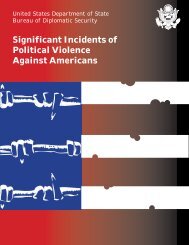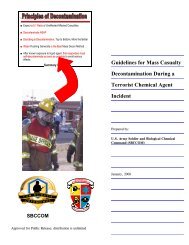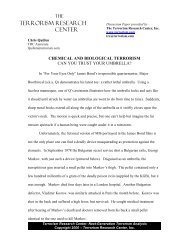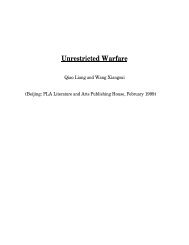Combating Proliferation of Weapons of Mass Destruction
Combating Proliferation of Weapons of Mass Destruction
Combating Proliferation of Weapons of Mass Destruction
Create successful ePaper yourself
Turn your PDF publications into a flip-book with our unique Google optimized e-Paper software.
(CTBT). The Verification and Compliance Staff within the Bureau contributes primarily toongoing negotiation, technology policy coordination, policy analysis, arms control effortsrelative to critical infrastructure protection, and interagency implementation efforts.The third bureau under the policy oversight <strong>of</strong> the Under Secretary is the Bureau <strong>of</strong>Political-Military Affairs. This bureau supports the Secretary and the Under Secretary inplaying a large role in security and defense policy. It provides analytic support for theSecretary and the Under Secretary on defense-related foreign policy issues, contributesto the coordination <strong>of</strong> peacekeeping and other military operations, is responsible for acluster <strong>of</strong> issues involving arms transfers, defense trade controls, and political-military anddefense cooperation in critical infrastructure protection, and also supports the UnderSecretary in coordinating security assistance.A scientific and policy Advisory Board on arms control, non-proliferation, and disarmamentreports to the Secretary <strong>of</strong> State through the Under Secretary, who maintains anoperational authority over the Board, including designation <strong>of</strong> members and staff. Inaddition, special representatives and envoys that previously reported to the ACDA Directorare now supported by their relevant DAS and report to that DAS and the Under Secretary.Finally, the new Bureau <strong>of</strong> East European and Eurasian Affairs manages U.S. relationswith countries that became independent after the collapse <strong>of</strong> the former Soviet Union. TheBureau ensures the effective utilization <strong>of</strong> public diplomacy, assistance, and conflictresolution efforts in pursuit <strong>of</strong> U.S. policy, and works to ensure effective coordination withthe new arms control and proliferation-related entities.New Role for the Under Secretary <strong>of</strong> Arms Control and International Security.Presidential Decision Directive 65, dated June 23, 1998, amends Presidential DecisionDirective/NSC-2, dated January 20, 1993, specifying that the Under Secretary <strong>of</strong> State forArms Control and International Security Affairs/Senior Advisor to the President and theSecretary <strong>of</strong> State for Arms Control, Nonproliferation and Disarmament shall, at thediscretion <strong>of</strong> the President, (1) be invited to attend all NSC meetings concerning matterspertaining to arms control, proliferation, or disarmament and (2) be invited to attend allNSC/PC and DC meeting concerning the same issues. It also provides that foreign policyand proliferation-related issues should be chaired at the Assistant Secretary level by theDepartment <strong>of</strong> State.The Under Secretary serves as a Senior Advisor to the President and Secretary <strong>of</strong> Stateon arms control, non-proliferation and disarmament. The Under Secretary is authorized tocommunicate to the President through the Secretary <strong>of</strong> State and participate, at thedirection <strong>of</strong> the President, in meetings <strong>of</strong> the National Security Council and its subordinategroups.27







